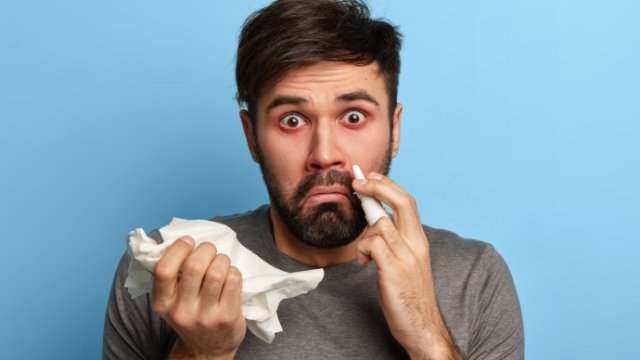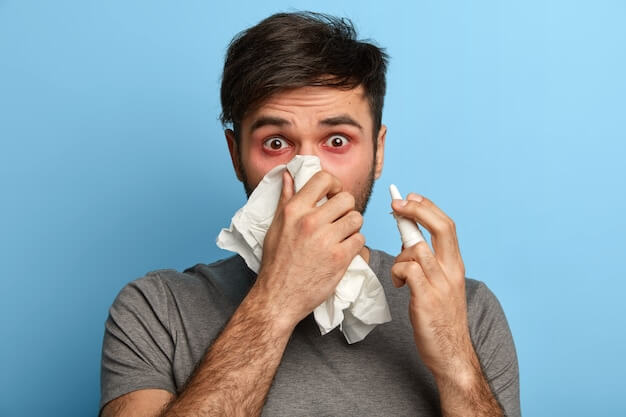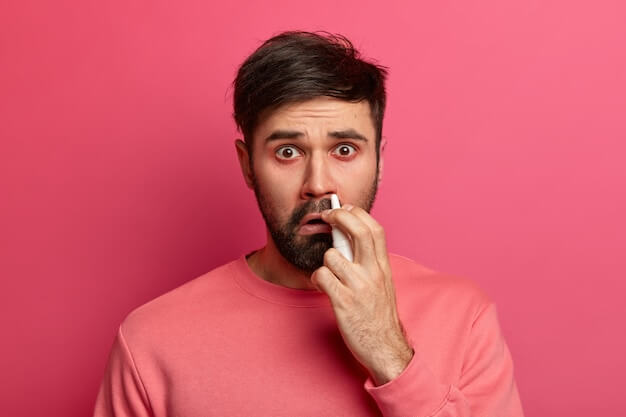Every season, I always feel that a lot of people around me have a cold. Their noses are like "faucets" that can't be turned off. They are running noisily. They often sneeze in a series. Their noses are blocked as if they are about to cut off oxygen. After blowing their nose and drying their tears, they are already exhausted when they finally can catch their breath.
Typical symptoms of allergic rhinitis
The most typical four symptoms of allergic rhinitis are: itchy nose, sneezing, clear runny nose, and stuffy nose.
Nose itch often occurs, accompanied by eye itch and throat itch, which is mainly caused by allergy. Because the conjunctiva, nasal mucosa and oral mucosa are all in an allergic state, these itching may exist at the same time.
Sneezing is more common in the morning or evening, which is related to the allergen.
After itching and sneezing, the nose often runs like clear water. When there is a lot of clear nose, obstruction may occur.
When the nasal mucosa is blocked due to nasal mucus, or when the nasal mucosa is swollen, it will be accompanied by nasal congestion.

Causes of allergic rhinitis
As we all know, our immune system has a "xenophobic function", which can identify and judge foreign objects entering the human body. When the immune system thinks that such substances are beneficial to the human body and are "our own", it will release them; If it is judged to be harmful to human body, the immune system will eliminate it.
Under normal circumstances, the nasal mucosa in the nasal cavity will protect our respiratory tract, and general pollen and dust will leave with the nasal mucus. However, some people with immune system disorders will make mistakes in judgment, and will regard them as pathogens harmful to the body, so as to produce corresponding antibodies to arrest them.
When the antibody contacts these "suspects", it will produce "fighting", and the normal cells in the nasal mucosa will suffer heavy casualties. There will be nasal congestion, sneezing, nasal itching, runny nose, cough and other symptoms. The nasal mucosa will also become inflamed, that is, allergic rhinitis.
The substances that cause inflammation, such as catkins, mites and pollen, are called allergens.

Misunderstandings of allergic rhinitis
1. Thought he had a cold
The typical symptoms of allergic rhinitis are sneezing, runny nose, stuffy nose, etc. The first reaction of ordinary people to these symptoms is a cold! Therefore, some patients with allergic rhinitis have been diagnosed for many years.
How should common people distinguish between allergic rhinitis and cold?
The typical symptoms of allergic rhinitis are mainly paroxysmal sneezing, clear runny nose, nasal congestion and itching, and some are accompanied by allergic symptoms such as hypoesthesia and cough.
The typical symptoms of common cold mainly include nasal congestion, runny nose, headache, fever, sneezing, fatigue and low spirits. The accompanying symptoms are mainly throat discomfort, mainly local symptoms, fever and chills.
The occurrence of a cold is usually accompanied by fever and general discomfort. The color of nasal mucus will gradually change from white to yellow, and the throat will be swollen and painful; Rhinitis not only does not cause fever, but also nasal mucus is clear water, and there is no sore throat, but the nose will feel more itchy. In terms of the season of onset, colds often occur in spring and winter, while allergic rhinitis may occur in a fixed period or throughout the year.
2. Allergic rhinitis needs no treatment
The symptoms caused by allergic rhinitis vary from mild to severe. Some people think that sneezing and runny nose are minor diseases that need not be treated, but this idea is totally wrong.
If allergic rhinitis is not controlled, be careful that it will accompany you to "grow" all the time. In severe cases, it may develop into sinusitis and nasal polyps. Long term rhinitis can also lead to bronchitis, allergic rhinitis and chronic obstructive pulmonary disease. If it is not cured for a long time, it can also cause allergic asthma. Finally, bad habits caused by rhinitis may lead to glandular appearance. Put it bluntly, it will be ugly.

How to relieve rhinitis symptoms
First, avoid contact with the "culprit" allergen that causes allergic reactions. For example, when patients with allergic rhinitis go out in spring and autumn, they should first close the doors and windows. When going out, they should remember to avoid going to the suburbs, parks and other places with high pollen concentration. If necessary, they must wear masks.
Patients with allergic rhinitis should pay attention to their diet, avoid smoking and alcohol, and be careful with seafood, greasy, spicy, cold cold food. Once you find yourself allergic to certain foods, you must avoid eating them again to avoid aggravating your illness.
The imbalance of the immune system also reminds us that we should pay attention to regular exercise to strengthen our physique, improve our immunity, and enhance our ability to adapt to allergic substances. Running, fitness, and aerobics are all good exercises.

Popular Articles
-
Fitness Equipment | How to choose a suitable for their own yoga mat?

-
 Home storage tips ---- hidden storage
Home storage tips ---- hidden storageMay 20, 2025
-
 These "home essential" recommended good things, small objects of great use!
These "home essential" recommended good things, small objects of great use!May 20, 2025
-
 The world's most clean animal
The world's most clean animalMay 20, 2025
-

Photos
The world's most beautiful big cities at nightMay 20, 2025
-
 Nourishing Blood and Staying Beauty, Strengthening Brain and Resisting Senility | Fried Black Fungus with Day lily
Nourishing Blood and Staying Beauty, Strengthening Brain and Resisting Senility | Fried Black Fungus with Day lilyMay 20, 2025







Comments
0